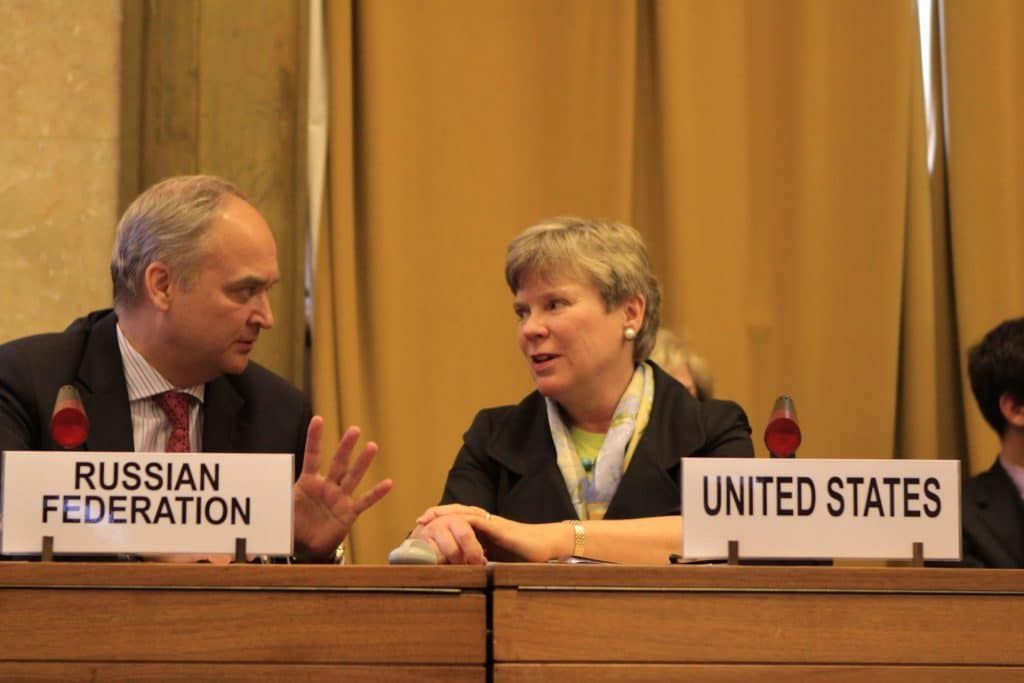Legal aspects of Russia’s New START suspension provide opportunities for US policy makers
By Rose Gottemoeller, Marshall L. Brown, Jr. | March 2, 2023
 New START negotiators Rose Gottemoeller, then-Assistant Secretary of State for Verification, Compliance and Implementation and Ambassador Anatoly Antonov of the Russian Federation made a joint presentation on the New START Treaty to international arms control diplomats at a June 3, 2010 plenary of the Conference on Disarmament. (Government photo)
New START negotiators Rose Gottemoeller, then-Assistant Secretary of State for Verification, Compliance and Implementation and Ambassador Anatoly Antonov of the Russian Federation made a joint presentation on the New START Treaty to international arms control diplomats at a June 3, 2010 plenary of the Conference on Disarmament. (Government photo)
Vladimir Putin sent anti-diplomatic shock waves around the world when he announced that Russia was suspending its implementation of the New START arms control agreement last week. In some ways, the announcement was no surprise; the Russian president likes to play big on the global stage to bring attention to himself and his interests, most of which today revolve around his fixation on subjugating Ukraine.
There is tragedy to this moment. Putin used to act on the world stage in a positive way that served Russia’s interests. Famously, he was the first to phone George W. Bush after the 9/11 attack, to offer Russia’s assistance in dealing with the tragedy. It was very much in Russia’s interest to join the United States in the fight against terrorism. Now, sadly, Putin seems untethered from Russia’s national interests and responds only to his own.
For the United States and its allies, this shift requires clear and deliberate policy making, clearly communicated to the Kremlin and to the world at large. In the case of New START, Putin’s suspension of his country from participation dictates that the United States focus in a dedicated way on US interests, especially in the realm of national security but also in foreign policy more generally and even on the domestic front. The international community will continue to look to the United States to lead in nuclear arms control and nonproliferation, even if Russia is playing a wrecking role in that realm. And US consideration of how to respond to Russia’s actions must bear in mind the potential future cost of losing New START and reemphasizing nuclear weapons in the national budget above domestic priorities that benefit everyday Americans. Simply put, the United States, in support of its own interests, should take every reasonable step to keep a pathway open to resuming the full implementation of New START.
As the US policy discussion shapes up, it is worth contemplating the details of the Russian decision, how they relate to international law, and what opportunities they might give the United States to formulate productive policy in this difficult period:
First, New START has no provision for suspension. What the Russians are doing is not permitted by the treaty. Nevertheless, they are grasping at international law and their own federal law to provide the arguments to back up the decision.
Russia is a party to the Vienna Convention on the Law of Treaties, which permits suspension under specific conditions. Article 62 describes those conditions, focusing on the notion of “fundamental change of circumstances.” Russian Senator Konstantin Kosachev zeroed in on this point in his presentation to the Federation Council, stating that the US “intent to defeat Russia” constituted a “fundamental change” as defined by Article 62. Afterward, Deputy Foreign Minister Ryabkov stressed that US assistance to Ukraine is the main driver for the “fundamental change” determination by Russia. Former Russian Ambassador to the United States Sergei Kislyak added that the alleged US intent to inflict a “strategic defeat” on Russia ran the risk of transforming New START into an instrument contributing to this strategic defeat, rather than the mechanism of strategic stability that it was originally intended to be.[1]
But the Russian reliance on Article 62 may not be as solid as the Russian lawyers would like it to be. Two conditions have to be met to assert a fundamental change of circumstances: that the existence of those circumstances constituted an essential basis of the consent of the parties to be bound by the treaty; and that the effect of the change is radically to transform the extent of obligations still to be performed under the treaty.
We both participated in the negotiations on New START and do not recall any statements being made during those negotiations, or during the ratification process on either side, or indeed in the text of New START, including its preamble, that allude to any US activity related to Ukraine. Indeed, neither the treaty nor its negotiation and ratification processes pertained to any activity not somehow related to strategic offensive arms, as constituting an essential basis of the parties to consent to be bound by New START. US assistance to Ukraine does not radically transform the extent of obligations still to be performed under New START. In other words, the US assistance to Ukraine does not affect, nor does it radically transform, New START obligations such as inspections, notifications, and consultations.
Whether or not there is justification for the suspension under Article 62, the Vienna Convention does contain an important point that may provide some hope for the full recovery of New START: Article 72, paragraph 2 states that “[d]uring the period of the suspension, the parties shall refrain from acts tending to obstruct the resumption of the operation of the treaty.”[2] This is something that the United States and its allies can focus on during this period, to call attention to any such acts and to hold the Russian Federation accountable. It also means that the United States has to be particularly vigilant in terms of its own acts.
In his presentation, Kosachev cited not only the Vienna Convention but also Article 37 of Russia’s Federal Law on International Treaties, which allegedly allows the president to terminate or suspend Russia’s participation in international treaties “if necessary.”[3]
These arguments make it clear that the Russians are running a play that they ran in 2007, when they announced their suspension of implementation for the Conventional Forces in Europe Treaty (CFE). In that case, the Kremlin also cited Article 37 and noted that the provision authorizes President Putin to suspend treaties “in instances requiring the taking of urgent measures.”[4] The law, the Kremlin stated at the time, also requires the president to submit a draft federal law concerning the CFE suspension to the State Duma. This identical procedure has now been followed in the case of the New START Treaty.
The Russians are not only running the CFE play, but they are also drawing on the precedent established during the transition from START to New START. In December 2009, the first Strategic Arms Reduction Treaty (START) was going out of force, but we had not yet completed negotiation of its successor. The New START Treaty was only completed in late March 2010 and signed at Prague by President Obama and then-President Medvedev on April 8. It then entered into its ratification process in both countries, entering into force in February 2011.[5] Thus, the United States and Russia faced a 14-month hiatus with no treaty in force.
The United States sought to engineer a bridging arrangement with the Russians to cover this period, one that would allow the continuation of on-site inspections and exchanges of data and notifications. Both sides readily agreed that they would stay within treaty limits, but the Russians balked at any further implementation measures. Their reasoning fell into two areas: First, they argued that the United States would drag its feet completing the actual treaty if such informal arrangements were in place. Second, they claimed that Russian law would not allow the presence of foreign inspectors in their sensitive nuclear bases without a legally binding treaty. According to them, only an international treaty ratified by the two countries’ legislatures could supersede Russian federal law.
The Russians tried to use the 1988 Ballistic Missile Launch Notification Agreement—which continued in force—as compensation for the lack of START notifications. The US side accepted this gesture, but found it pretty meaningless since START notifications relate to any number of operational activities in the strategic nuclear forces. Missile test launches are only a small subset of these activities.
The same pertains today: The 1988 launch notification agreement cannot in any sense be equated to New START notifications, of which over 25,000 have been exchanged during the 12-year life of the treaty. They give each side, Russian and US alike, an excellent, 24/7 picture of the day-to-day operations of the strategic nuclear forces of the other. Launch notifications are a very small subset.
To sum up: The Russians are traveling a well-worn legal path from their perspective, one that is consonant with recent precedent, international law, and their own domestic law. Of course, in the context of Russian noncompliance with arms control treaties, most recently, the Intermediate-Range Nuclear Forces Treaty (INF), this attempt to grasp at legal straws seems cynical and reckless. Nevertheless, it highlights a few areas in which the United States can fashion a policy response that keeps a path open to resuming New START’s full implementation.
First, suspension is not withdrawal. “Suspension” means that there is still a legal relationship between the parties, and the existence of this relationship should be emphasized at all levels. The Ministry of Foreign Affairs has stated that Russia will abide by all the limits established by New START; the United States, of course, will do so. As noted above, the Vienna Convention calls on all parties to refrain from acts during a suspension that would obstruct the resumption of operation of the treaty. Again, this is something that the United States can focus on during this period, to call attention to any such acts and hold the Russian Federation accountable. The United States likewise has to be vigilant that its own acts do not constitute obstruction.
Moreover, suspension does not compel US withdrawal from the treaty. New START, as is the case for many arms control agreements, has a specific provision that addresses withdrawal. Article XIV, paragraph 3 provides that “[e]ach Party shall, in exercising its national sovereignty, have the right to withdraw from this Treaty if it decides that extraordinary events related to the subject matter of this Treaty have jeopardized its supreme interests.” The party intending to withdraw must provide a statement on the “extraordinary events [it] regards as having jeopardized its supreme interests.” We do not see that Russian suspension constitutes an extraordinary event that jeopardizes US supreme interests. The Russian decision is disappointing, unwarranted, and unwise, but it does not jeopardize US supreme interests, and we encourage the Russian Federation to reconsider its decision. It is not too late.
Second, the United States will make its own determination about how much information to share during this New START suspension. Certainly, from a legal perspective, the US side is not required to continue providing information under the treaty if the Russian side is not reciprocating. However, the United States may decide to provide some information as a gesture of its willingness to resume full implementation of the treaty as soon as possible. This would be a signal to the Russians, but also to the larger international community that is so concerned about the Russian action.
One example might be to provide on a public platform information that would normally go into the twice-yearly data exchange that the two parties conduct. Even if the Russians are not providing data, the United States should continue to post its data on the State Department website and message prominently its willingness to continue to do so.
The United States might also describe to the public the type of information that is provided in notifications that are passed between the two parties. The categories of notifications are provided in treaty documents and are not sensitive, even if the contents of notifications are. In that way, the public will develop a clearer understanding of what is being lost if the two sides are no longer exchanging New START notifications. The predictability about the day-in, day-out status of the strategic nuclear forces of the two countries, which is eminently in the interest of both, will be lost. This loss of predictability is the most damaging impact of the suspension and should be a clear message to the international community.
In this way, the United States can encourage not only the public, but also global leaders, to communicate to the Kremlin the damage that New START suspension will inflict on international security. The controls on strategic nuclear forces that New START embodies are in the interest not only of the United States and Russia, the two biggest nuclear powers, but of the entire global community.
Notes
[1] The pre-vote discussion, in Russian, can be watched here between 18:30 and 42:00: https://rutube.ru/video/4b09a81e38bedecb4522fa15668811b2/
[2] https://legal.un.org/ilc/texts/instruments/english/conventions/1_1_1969.pdf.
[3] See Kosachev statement in https://rutube.ru/video/4b09a81e38bedecb4522fa15668811b2/
[4] For a thorough discussion the Russian CFE suspension, see Duncan Hollis, “Legal Consequences of Russia’s CFE Treaty Suspension,” American Society of International Law, 2007, https://www.asil.org/insights/volume/11/issue/19/russia-suspends-cfe-treaty-participation.
[5] A description of these events may be found in Rose Gottemoeller, Negotiating the New START Treaty, Cambria Press, 2021.
Together, we make the world safer.
The Bulletin elevates expert voices above the noise. But as an independent nonprofit organization, our operations depend on the support of readers like you. Help us continue to deliver quality journalism that holds leaders accountable. Your support of our work at any level is important. In return, we promise our coverage will be understandable, influential, vigilant, solution-oriented, and fair-minded. Together we can make a difference.
















